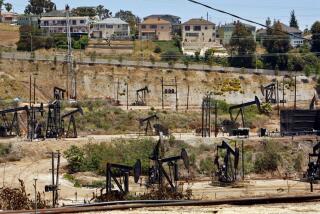Amid protests, report finds no harm from fracking
- Share via
A new report on hydraulic fracking at the Inglewood Oil Field found that the controversial oil extraction method used at two wells did not have significant effects on the environment or on the health of those living near the 1,200-acre site.
More than 200 residents of the Baldwin Hills area turned out Monday evening to hear the findings and question the author of the environmental impact study. The meeting was organized by Plains Exploration & Production Co., the owner and operator of the field that paid for the study, and was held at Knox Presbyterian Church in Ladera Heights.
As the findings of the yearlong report were announced by its author, Daniel Tormey of Cardno Entrix, some residents shook their heads in disbelief, some jotted down notes, while others held up signs that read “Stop Fracking Now” and “Stop the Insanity.”
The technique involves the injection of water, sand and chemical additives at high pressure to fracture the rock formations below to released trapped oil and gas.
But the method has come under criticism amid allegations that it contaminates underground water and increases seismic activity.
Residents living around the oil field have complained about ground movements damaging their properties. Some suspect that the drilling operations of Plains Exploration is causing the movement. But the area also lies atop of the Newport-Inglewood fault.
Tormey said the movements were not related to the company’s activities. He said 21% of the properties were damaged by natural slope instability, which was induced by rainfall.
Residents such as Gary Gless, founder of the Citizens Coalition for a Better Community, weren’t buying it.
“They cannot control the earth,” Gless said.
Other findings show that the groundwater beneath the field is not the source of drinking water for the region. Instead, Tormey said, the water is imported from Northern California and Colorado. Still, he added, the water underneath the field meets drinking standards and no impacts were recorded when the oil extraction method was used at the field.
Environmental and community groups have been critical of the findings and question the validity of the report.
They say the study lacks independent scientific scrutiny and that at least one of the peer reviewers has close ties to the energy industry.
Moreover, the critics say, the report’s conclusion is based on near-term effects and fails to address fears of long-term damage — such as the potential risk of chemical additives leaching into groundwater.
The report was peer reviewed by two firms selected by the oil company and Los Angeles County, per a settlement agreement made last year with environmental and community groups.
“It just seems like the practice is not safe,” said Jessica Yurasek, a resident of Culver City, who clearly wasn’t convinced.
Neither was Chris Paine, also a resident of Culver City.”This is Texas money,” Paine said. “They just want to make money.”
More to Read
Sign up for Essential California
The most important California stories and recommendations in your inbox every morning.
You may occasionally receive promotional content from the Los Angeles Times.














